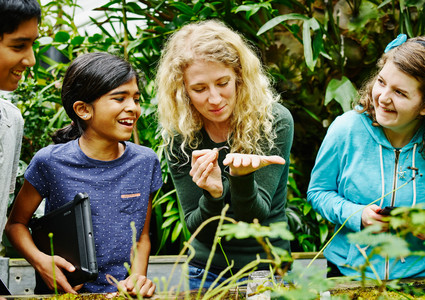Mental Health
Mentor One Person, Change Two Lives
Published: Jan. 23, 2020

Think back to childhood. Was there a mentor who made a difference in your life? Perhaps you were in a mentoring program, or maybe your mentor took a different form, such as a volleyball coach, a music teacher or an older relative.
It’s never too late to thank the mentors in your life and to consider paying it forward by becoming a mentor yourself. You won’t only change a young person’s life – you’ll likely change yours, too.
Benefits of Mentoring
Today’s young people are growing up with challenges that older generations never experienced, especially when it comes to technology and social media. That’s why in-person connection is more important than ever before. Mentoring helps young people from all backgrounds but is especially beneficial to youths from single-parent families or low-income neighborhoods. A mentor’s consistent friendship and time may offer stability where little exists. At-risk youths who have mentors are more likely to enroll in college, volunteer regularly, hold leadership positions and become mentors themselves.
Other benefits for mentees include:
- Improved interpersonal skills
- Stronger relationships with parents, peers and other adults
- Increased self-esteem and self-confidence
- Better self-regulation of emotions and impulses
- Decreased violent behavior and bullying
- Better grades
Mentoring can also boost a mentor’s self-esteem, give them a sense of accomplishment and provide them a new network of people. But many adults struggle with finding the time or thinking they have nothing to offer a young person. Becoming involved is a challenge, but the reward can be phenomenal. And if mentoring is something you’re interested in, finding the time might be easier than you think through either formal or informal mentoring.
Formal Mentoring
Formal mentoring takes place through a program or organization. Mentors are matched with mentees. Structure, training and support vary from program to program. Do you have more time to volunteer after work or on the weekend? Do you want to mentor at a facility or do you want the flexibility to take your mentee off-site? Research formal mentoring programs to see what aligns with your goals and schedule. Trusted programs and resources in the Omaha area include but are not limited to:
- MENTOR Nebraska
- Big Brothers Big Sisters of the Midlands
- Boys & Girls Club of the Midlands
- Girls Inc. of Omaha
- TeamMates Mentoring
- Partnership 4 Kids
 Informal Mentoring
Informal Mentoring
Informal mentoring happens every day in a young person’s life. A mentor could be a coach, scout leader or family friend. The relationship has less structure and can be as simple as sharing a skill or hobby, like an uncle taking his nephew fishing regularly.
If you don’t know where to start or feel hesitant, the key to overcoming inhibitions is relying on interests or skills you already possess. If sports were your thing in high school or college, share your athletic skills and look for coaching opportunities. If you have a love for science and technology, robotics and computer clubs in schools might need your expertise. Were you a theater nerd? See if there are workshops or programs for kids that need volunteers. Whatever your hobby or ability is, a little research will reveal opportunities to become involved.
Closing the Mentoring Gap
Mentoring in your community or through a program is a rewarding use of time and energy, and there are many ways to find time in your busy schedule. One in three young people grows up without a mentor – denying them opportunities to grow personally, socially and financially. Help close the mentoring gap by sharing your passions and skills with those who are eager to learn and have a friend. Remember – none of us got where we are today alone.
More Resources
- Learn how social media affects your teen’s mental health.
- Read how volunteering can help your health as you age.
- Learn more about the Best Care Employee Assistance Program.

